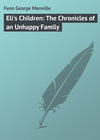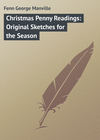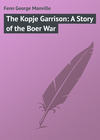Buch lesen: «Eli's Children: The Chronicles of an Unhappy Family», Seite 27
Part 2, Chapter XVI.
A Meeting – and Parting
Three years passed away, and Julia’s disappearance remained a mystery to all, and it was calmly put away upon the dusty shelves of the past – by all save one.
Father had mourned for her, and time had somewhat assuaged his grief; mother had wept in silence upon her weary couch; sister talked less often now of ‘poor Julia’; brother, when he was seen, never mentioned her name. The whole matter had grown misty and pale in the distance of the bygone to all save James Magnus, and from that night he had never rested. Detectives had grown cold; other affairs had taken their attention; but nothing had checked the cold, stern, haggard man whose one aim in life now was to stand face to face with the ruffian who had made his life a wreck. Had Julia married Perry-Morton, he would have borne it in silence; but this was an outrage to his feelings that he could not bear, and taking sketching materials as an excuse, he had started off to find them, though he rarely put brush to paper now, for he was incessant in his searchings, and every likely nook and corner in London and the great cities was visited by him in turn.
Now he was wandering in the country, having had news that seemed to promise success; now away off to some out-of-the-way spot in the New Forest, or Herefordshire, where gipsies made their home; always on the scent, but never successful. He had tracked out scores of burly ruffians, but they were none of them the man he thought to meet.
Back again in London in the east, in the lowest purlieus of the south, in common lodging-houses, on waste grounds where caravans were drawn up for the winter; off to racecourses and fairs, and great markets where such men as Jock Morrison were to be found, but always in vain.
Once he heard of him, as he thought, at Horncastle, at another time at Newmarket, and again on Epsom Downs, but it was always some great idle ruffian bearing a slight resemblance to Jock Morrison, never the man himself.
And in all those solitary wanderings, James Magnus carried the pistol he had bought, and practised with it in his lonely walks. Hundreds upon hundreds of times those chambers were discharged, his marks being trees, fingerposts, saplings rising out of hedges; and though the artist seemed day by day to grow thin, careworn, and weak, his nerves were as if of steel, and each bullet flew upon its course with unerring aim.
“The law cannot touch him,” he muttered, with a strange smile; “perhaps a bullet can.”
It was on a bright afternoon in May that, seeing no beauty in the verdant spring and the return of sunny days, James Magnus, heartsick and worn out, crawled back to his chambers to find Burgess anxiously expecting him, for he had been away longer than was his wont.
“Oh, I am glad to see you back, sir,” he said. “Set down, sir, and let me take off your dusty boots. You look worn out. Lord Harry has been here – not an hour ago.”
A faint smile came upon the face of Magnus, as he heard the name of his friend, and taking up the card he rose to go.
“Going, sir, so soon?” exclaimed his man.
“Only to see Lord Artingale,” said Magnus, wearily. “I’ll soon be back.”
On reaching his friend’s house in Lowndes-square, the servant told him that his lordship had gone into the Park with her ladyship. They were in the open carriage; and wondering at his own weariness, Magnus followed, unconsciously walking straight to the very spot where, what seemed a lifetime back, he and Artingale had leaned over the rail, and first seen poor Julia’s fate.
He did not recall the fact at first, but stood watching the carriages, thinking how much he would like to meet his old friend; and his face lit up with a smile that had been a stranger to it of late.
For a long time it seemed as if his journey had been in vain, and he was listlessly scanning the long lines of vehicles, when suddenly he heard his name uttered, and a carriage was drawn up close to the rails, with Artingale and Cynthia therein, both looking, if not so young, as bright and happy as ever.
“My dear old fellow,” cried Artingale, grasping his friend’s hand, as Cynthia possessed herself of the other, “I can’t tell you how glad I am to see you. But jump in, and we’ll go home at once. We’ll have such a dinner, and those dining-room curtains shall be incensed, and no mistake, to-night.”
“No, no, not now,” said Magnus; and in spite of all his friend’s pressure he declined.
“Then I shall come with you,” cried Artingale. “Cynthy, may I go?”
“I suppose you must,” she said merrily. “Mr Magnus, you are the only gentleman to whom I would give him up.”
Then there was a pleasant chat for a time, the carriage drove on, and Artingale and his friend were left standing by the Park rails.
“Not one word,” said Magnus to himself; “Julia is indeed dead.”
“Why, Mag, old man, this is the very spot where – ”
“Hush! Look!” cried Magnus, grasping his friend’s arm. “God, I thank Thee. At last – at last!”
Artingale followed the direction of his eyes, and started, for there, on the other side of the drive, was the great picturesque ruffian, slowly sauntering along, quite unchanged, and with the same defiant air.
Artingale restrained his friend, who was about to leap over the railings.
“No, no,” he whispered, “let’s follow him, and see where he goes. We shall find her then.”
It was a slow task, for Jock Morrison went first out on to the grass and lay down for an hour, but the watchers did not quit their post for a moment, but tracked him when he rose, step by step, and along the great highway due east, till he turned up Grey’s-inn-lane, and then up one of the narrow courts.
It was as ill-favoured and vile as any there, and for the moment Magnus thought he had missed his man, but as, in spite of the scowling looks around, he hurried down the court, a heavy step on one of the staircases acted as his guide; and, closely followed by Artingale, he bounded up to the second landing, which he reached just as a door was slammed to, and he turned a countenance upon his friend that made him shudder.
“At last, Harry,” he said in a low whisper. “At last! God of heaven, how I have prayed for this time!”
“Stop,” cried Artingale, excitedly; “you shall not go in. Give me that pistol, Magnus. You shall not go.”
He clung to his friend’s arm, but Magnus threw him off.
That there was no mistake was evident, for from beyond the filthy paintless door came the hoarse bullying tones of the fellow’s voice, and, unable to contain himself longer, Magnus dashed open the door, and stepped in.
He was greeted by a volley of oaths, and the great ruffian started up from a bed upon the floor where he had evidently thrown himself down, and as he did so, with a face like ashes and his teeth set, Magnus covered him with his pistol.
Artingale was in the doorway, and saw it all, but stood paralysed at his friend’s act. But another moment, and the bullet would have sped upon its deadly errand, when, with a cry, a woman threw herself between them, placing herself with her back against Jock’s breast, and her arms thrown up to screen his face, as, with flaming eyes, she faced the intruders upon her home.
“Stand aside, Ju, I’m not afraid of his barker,” roared the great ruffian, with a blasphemy; but the woman clung to him and held him back as the pistol dropped upon the floor, and Magnus staggered against his friend.
The recognition was mutual, but the woman’s face remained unchanged. It was filled with the passionate desire to protect the ruffian who treated her a little worse than he would have treated his dog; and as he read the history of her life in what he saw, Artingale stood speechless for a few moments, while Jock swung his defender on one side, strode forward quickly, and picking up the pistol, put it in his pocket.
“Julia,” exclaimed Artingale, recovering himself and advancing, “do you not know me?”
She looked at him fixedly for a few moments. Her face began to quiver, and her hand was slightly raised to take the one he extended; but she became rigid directly after, and turned away to cling to Jock Morrison, who, with his hands in his pockets, looked mockingly on.
“No,” she said, in a sharp, harsh voice, as changed as was her thin, worn, piteous face from that Artingale had known in better days. “No,” she said, “I do not know you; the Julia you knew is dead.”
“Well,” said the great fellow, roughly, “have you any more to say to my wife? Because if not, go.”
Artingale felt like one in a dream, as he fell back, and the door slammed to; then slowly descending, careless of the curious eyes and scowling looks directed at them, he joined his friend, and they went back to the studio, where Magnus threw himself wearily down and closed his eyes.
“But I must do something,” exclaimed Artingale; and, rushing out, he had himself driven to Great Scotland Yard.
“What can you do, my lord?” said the officer he saw. “From what you say, the fellow has married her, and we can’t undo that. I’ll take what steps you like, my lord, but – ”
But! There was a volume in that one word, for when afterwards effort after effort was made to win the wanderer back by father, mother, sister, all was in vain. She had spoken truly. The Julia whom Harry Artingale had known was dead.
It was close upon twelve that same night that, sick at heart, Artingale returned to his friend’s chambers, to find that Burgess had been busy preparing supper, feeling sure that he would return.
“Where is your master?” said Artingale.
“He said he would go and lie down, sir, till you came. He thought you would be sure to come back to-night. But oh, my lord – oh sir,” cried the poor fellow piteously, “can’t you do something to make poor master what he was? This is weary work indeed!”
“I don’t know, Burgess. I can’t say. I’ll try, but I hope he will be better now.”
“I hope and pray he may, sir,” said the man, fervently; and Artingale went on into the bedroom, to see that his friend had placed Julia’s picture on the easel at the farther side of the bed in full sight from where he lay; and as the young man’s eyes lighted upon the prostrate figure, he uttered a cry which brought in the man.
“Quick, Burgess, quick! The nearest doctor.”
A fruitless errand: James Magnus, after his long and weary pilgrimage, was resting peacefully where there is no dreaming of revenge.
Of a broken heart! So it was said, for the secret was well kept. There are men who dare to make the rush headlong from this world.
Part 3, Chapter I.
Part 3 – The Barrister’s Day.
In Chambers
“With a rum-tum, tum-tum, tiddy-iddy tum, tiddy-rum-tum, tiddy-iddy bang!”
This was sung in a low-pitched, not unmusical voice, by a stunted, thickly-set lad of seventeen or eighteen, being his version of the well-known “March of the British Grenadiers”; and as he puffed forth the air in imitation of a wind instrument, the musical youth paraded the well-furnished office he occupied, with an enormous ebony ruler over his shoulder, held sword-fashion, and the stove poker in his left hand carried like a scabbard.
He was so far on the alert that he kept one eye upon a green baize-covered inner door, evidently leading into a private room, but not sufficiently watchful to see that another door had been opened, for as he got through a second strain of the march he called, softly, in imitation of a commanding officer, “Halt! – right about face. Band to the front!” Then his jaw dropped, and he made a bound to his desk.
The reason of this change was that a stern, dry-looking, well-dressed man stood there, with an umbrella in one hand, a blue bag in the other, and he did not smile, but showed his teeth slightly, as he saw the lad’s confusion.
“Drilling, eh?” he said, shutting the door close behind him. “Going to join the army?”
“No, sir,” said the boy, smartly.
“Of course not,” said the visitor. “Much too short.”
“Please, sir, I can’t help that,” said the boy, whose face was now scarlet; “and I shall grow.”
“Only wiser, boy,” said the visitor, “not taller. Wiser; and then you won’t go and be shot at for a few pennies a day. Mr Ross in?”
“Don’t know, sir. I’ll see,” said the boy.
“Yes, you do know,” snarled the visitor; “and he is in, or else you wouldn’t have gone about on tiptoe. Take in my card.”
“Mr Swift, Cripple and Swift,” read the boy.
“Yes, and be quick. Time’s money, boy.”
“Yes, sir. Take a chair, sir,” said the lad, whose martial ardour had cooled into business; and he opened the baize door, let it close behind him, and knocked at the panel of an inner door, the knock sounding muffled and distant to the visitor.
“Come in!”
The boy entered a handsomely-furnished room, in the middle of whose Turkey carpet was a large, well-drawered writing-table, covered with papers tied up in red and green tape. On one side was a handsome, polished wardrobe, half open, displaying, hanging from pegs, a couple of barrister’s gowns, looking in the dim interior like a couple of old-fashioned clergymen hung up to dry, or for some other reason.
In another polished-wood cupboard, with glass doors partly covered with blinds, were apparently a couple of stuffed barristers in their wigs, gazing mournfully through the glass at the opening door of the office, till a second inspection showed them to be wig-blocks, with their legal horsehair burdens grey and stiff.
Cases full of thick volumes, a couple of busts of famous judges in their wigs, and here and there an almanack, a pale blue sheet of paper, printed with the dates of various judges’ circuits, and, lastly, a tall oaken case full of pigeon-holes stuffed to overflowing with legal papers, formed the surroundings of him who said “Come in.”
The speaker was in a dressing-gown and slippers, seated at the writing-table, with his head resting upon his hands, evidently studying intently the contents of certain sheets of paper, closely written in a clear round hand, but with a broad margin, whereon from time to time the reader made notes, by means of a gold pencil-case.
His face was bent so low that nothing but the broad forehead was visible when he set one hand at liberty to write; but it could be seen that this broad, open brow was lined by study, and the dark hair was cut off closely to the reader’s head.
He did not look up when the boy entered, but said, in a quick, decided voice —
“Well, Dick?”
“Gentleman to see you, sir,” said the boy; and he placed a card upon the writing-table, at which card the reader glanced, but without changing his position.
“H’m, Mr Swift,” he said. “Show him in.”
The visitor needed scarcely any showing, for as the boy went back he was ready to step in at once, and his stern, harsh, rather unpleasant face seemed to wear a satisfied air as he took all in at a glance.
“Good morning, Mr Ross,” he said, as the reader rose and showed the face of Luke Ross, twelve years older, and pale and thin, but with his dark eyes, rather deeply set, now full of vigorous intelligence, as he seemed to look his visitor through and through, and motioned him to a seat with a wave of a thin, delicate white hand, upon which shone a heavy unornamented signet ring.
“I think you know our name, Mr Ross,” said the visitor, with an air of self-satisfaction, as he laid his blue bag across his knees.
“Perfectly well, Mr Swift,” said Ross, quietly. “I was against you in that shipping case last week.”
“Yes, sir, you were,” said the visitor, with a smile that looked like a snarl; “and you beat us, sir – beat Philliman – and that’s why I have come.”
“Mr Philliman worked very hard for your client, Mr Swift,” said Luke, quietly. “I presume that you bear no malice?” he added, with a smile.
“Malice, sir – malice, Mr Ross? Ha, ha, ha! That’s very good, sir – uncommonly good. I’ll tell Cripple as soon as I return.”
“I know you’ll excuse me, Mr Swift,” said the young barrister, glancing at his watch, “if I tell you that my time is very much occupied.”
“Of course! To be sure. Yes, my dear sir,” said the visitor, busily opening his blue bag. “I know it is. But as it was our first affair with you, I thought I would come on myself instead of sending our clerk. There, sir,” he exclaimed, drawing out a folded packet of papers, tied up with tape, “I have come to show you how we bear malice, sir – our first brief.”
As he spoke he handed the papers to Luke Ross with the triumphant smile of one who is conferring a great favour, and then, throwing himself back in his chair, he looked quite disappointed as the barrister just glanced at the endorsement on the brief, which, among other words, bore certain hieroglyphics in a crabbed hand – “15 gs.”
“I am sorry to have troubled you to come, Mr Swift,” said Luke, in a quiet, grave voice, that was very impressive, and, though low, seemed to fill the room, “but I really must decline.”
“Decline!” exclaimed the solicitor, flushing. “Do you know, Mr Ross, that this may mean an enormous number of briefs from our firm, sir – a very fortune?”
Luke bowed.
“You are a young man, Mr Ross – excuse me for saying so, sir – just making a name in your profession. Do I understand you aright, sir? Our firm, sir, stands high.”
“Perfectly aright, Mr Swift,” replied Luke, in a voice that quite seemed to silence the solicitor, who refreshed himself with a hastily-taken pinch of snuff, and shut the lid of his box with a loud snap. “I know your firm well, sir; but, as you are aware,” he added, with a grave smile, “there are limits to even an enterprising barrister’s powers, and the profession has been kind enough to give me more than I care to undertake.”
“Ah, exactly, sir – of course – yes,” said Mr Swift, smiling, and nodding his head. “Exactly so, my dear sir. Will you allow me?”
Luke bowed, and before he had quite realised his visitor’s intentions, he had caught up a quill pen, and, rapidly dipping it, altered the fifteen on the back of the brief with a couple of touches into twenty-five, blotted it, and handed it to the young barrister, who raised his hand not to take the brief, but to decline.
“I am sorry, Mr Swift,” he said, “but I have sent back a couple of briefs this morning marked precisely as you have endorsed that. I am obliged to decline. Try Mr Norris, or Mr Henrich, on this staircase. I am sure they will be glad to accept the brief.”
The solicitor stared in astonishment, took out his snuff-box, put it back again, and then exclaimed sharply —
“But I want you, sir, you.”
“Then,” said Luke, smiling, “I am afraid you will have to double the fee upon the brief, Mr Swift. So much work has come to me of late, that I have been compelled to make that my fee.”
“And with a refresher, sir?” said the solicitor, dropping the patronising air for one of increased respect.
“And with a refresher, sir,” replied the young barrister.
Mr Swift glanced from him to the brief he had been studying and back.
“Why, you are not in Regina versus Finlayson, sir?” he said. “Morley and Shorter told me that they had given the brief to some one, endorsed fifty.”
“I am the humble individual, Mr Swift,” said Luke, who in his calm, grave way seemed to be amused.
Without another word the solicitor snatched up the quill, dipped it, and dashing out the twenty-live guineas, rapidly wrote above it “50 gs.”
“There, sir,” he said, blotting it with a bang upon the writing-table, “we must have you, sir. We want to have you, Mr Ross. You will take this for us – it’s for the prosecution, sir, – a most important case. It is, really, sir.”
“It is astonishing how often the case is most important in the eyes of the firm of solicitors, and how very ordinary it turns out, Mr Swift, when it comes into court. But there, Mr Swift, I’ll do my best for your client,” and he rose.
The solicitor took the hint, and picked up his hat and blue bag.
“Thank you, Mr Ross; thank you, sir. I am very, very glad. Our first brief, Mr Ross. The first, sir, of many. Good morning.”
He shook hands with a look of the most profound veneration for the eminent young legal light, whose brilliancy was beginning to be discussed a good deal, both in and out of court.
“Good morning, Mr Swift,” said Lake. “I’ll try and get you a verdict.”
“You will, sir; I’m sure you will,” said the solicitor, bowing as he reached the door, and then hurrying back. “One moment, Mr Ross – a word from an old limb of the law, sir. You are a young man, and not above listening to advice.”
“Certainly not,” said Luke, smiling, “if it be good.”
“’Tis good, sir. Take it. Do away with that boy, and have a quiet, elderly clerk, sir. Gives dignity to your office. Good morning.”
He nodded this time, and shut the door after him, carefully opened the baize portal, and passed through that, to change his whole aspect as he found a very tall, thin, cadaverous-looking man, in glossy black, and with a heavy gold eyeglass swinging outside his buttoned-up surtout.
The countenance of the tall, thin man changed a little, too; but they shook hands warmly.
“Won’t do, Hampton, if you’ve come about the Esdaile case,” he said.
“Never you mind what I’ve come about,” said the tall man, with asperity.
“Oh, I don’t, my dear sir, for we’ve got Ross for the prosecution.”
“Con – Tut, tut, tut. Oh, hang it, Swift, this is too bad.”
“Ha, ha, ha!” laughed the solicitor.
“But, look here, honour bright?”
“Honour bright, my dear sir. Go and ask him.”
“I’ll take your word, Swift. Give me a pinch of snuff. What, have you endorsed the brief, eh?”
The solicitor whispered.
“Have you, though? Well, I should have done the same. It will be silk one of these days.”
“Safe, sir, safe,” said the other; and they went out together, just as a cab stopped at the end of the narrow lane, and, looking very thin and old, and dry, but bright and active still, old Michael Ross stepped out; and then, with a very shabby, long old carpet bag in one hand, and a baggy green umbrella, with staghorn handle, in the other, trotted down the incline into the Temple till he reached the staircase, at the foot of which, on one of the door-posts, was painted a column of names.
“Hah!” said the old man, smiling, as he set down his bag, and balanced a clumsy pair of glasses on his nose, holding them up with one hand. “This is it. Number nine. Ground floor, Mr Sergeant Towle; Mr Barnard, Q.C. First floor, Mr Ross.”
“Hah!” he muttered, with a chuckle, “first floor, Mr Ross. I wonder whether he’s at home.
“No,” he ejaculated. “That’s wrong. Should be, ‘I wonder whether he’s in court.’”
The old man stopped short in the entry, with the door leading to Mr Sergeant Towle’s chambers before, and that leading to the chambers of Mr Barnard, Q.C., behind, and drew forth his washed-out and faded red cotton handkerchief.
“I wonder whether he’ll be glad to see me,” he said. “I’m only a shabby-looking old fellow, and I dare say I’ve brought the smell of the tan-pits with me; and they tell me my son is getting to be quite a famous lawyer – quite the gentleman, too. Ah, it’s a great change – a great change. And I didn’t tell him I was coming; and p’raps it isn’t right to take him so by surprise. He mightn’t like it.”
The old man rubbed his damp fingers on his handkerchief, and looked about him in a troubled, helpless way.
“I feel always so mazed-like in this noisy London,” he said, weakly; “and if he was hurt about my coming it would about break my heart, that it would.”
The handkerchief was on its way up to his eyes, where the weak tears were gathering, when there was the sound of voices in the chambers of Mr Sergeant Towle, and, snatching up his bag, the old man trotted, pretty nimbly, up the stone stairs to the first floor, where, upon the pale drab door, there was the legend, “Mr Ross.”
“Mr Ross,” said the old man, chuckling to himself. “Mr Ross. That’s my son. God bless him! My son; and I’d have given a hundred golden pounds if my dear old wife had been alive, and could have stood here and seen his name writ large and famous on a door in London town like that.”
He stood admiring it for some minutes, and then hesitated, as if overcome by the importance of his son; but at last he raised the big umbrella, and tapped gently with the staghorn beak.
It was a very modest knock, and it was not answered, so at the end of five minutes he knocked again.
This time Mr Richard Dixie – Dicky Dix, as he was familiarly called – verified the words of Mr Swift, the solicitor (Cripple and Swift, of Gresham-street), by staring hard at the shabby-looking little old man and his bag, and then coming a little way out to stare at the doorpost, to the surprise of old Ross.
“It ain’t broke,” said the boy.
“What isn’t broke, sir?” said the old man, humbly.
That ‘sir’ was like so much nerve to one who did not need it; and, turning sharply to the old man, he gave another glance at the shabby bag.
“Then what do you want to come a banging at the door with your old umbrelly for?”
“I didn’t see the bell, sir,” said the old man, humbly. “Is – is your master in?”
“Got anything to sell?” said the boy, sharply.
“To sell, sir? Yes; a good deal. The market’s been very bad lately. Is your master, Mr Ross, in?”
“No, he ain’t,” said the boy, sharply. “Don’t want any. Take your bag somewhere else. We gets ours at the stationer’s.”
The old man stood aghast, for the boy gave his bag a kick and shut the door to sharply, without another word.
“He’s a quick, sharp boy,” said the old man; “very impudent though. A regular London boy; and Luke’s out. Well, well, well, I’ve come a long way to see him, and I can wait,” and without another word, the old man seated himself patiently at the foot of the next flight of stairs, placing his bag beside him, and his green umbrella across his knees.




















